



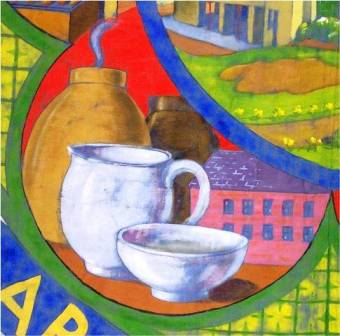
JOHN McNAY
John McNay, son of George, was born in Cow Wynd, Falkirk on 8th August 1861.
John had a love of the sea and in his teenage years he tried, unsuccessfully, to run away to sea on two occasions. On his third
attempt, he was finally allowed to stay and he worked on the merchant ship Gryfe on two occasions, both times meriting a Very Good
report for his ability and conduct.
In 1887 when Charles McNay (Johnís uncle) decided to build a new pottery at Bridgeness, John was given the job of designing and
overseeing the building of these new works. Once the pottery opened, he was made manager.
On 6th October 1887, he married Elizabeth Greenhorn at her home in Comely Park Terrace, Falkirk. Elizabethís brother was a
merchant seaman as was her late father.
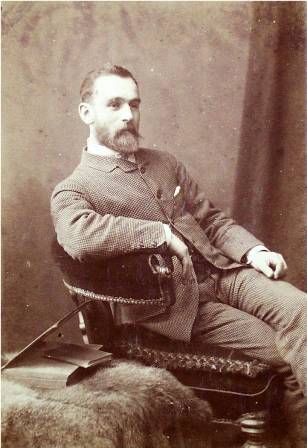
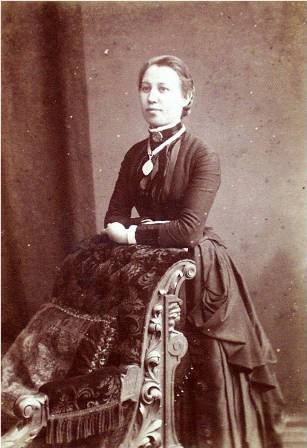
John McNay & Elizabeth Greenhorn

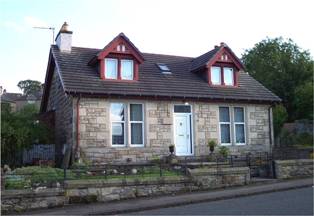
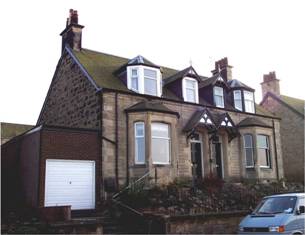
John and Elizabeth began their married life in Bankhead Cottage (right),
Boíness. One year later, on 17th October 1888, their daughter, Janet Ritchie
McNay, was born there. John was described as Manager of Pottery on both
Janetís birth certificate and his own marriage certificate.
However, their stay in Bankhead Cottage was a short one.
In 1890 they moved to Philpingstone Lodge (left) in Philpingstone Road,
Bo'ness giving John a much shorter two minute walk to the pottery.
In 1898, John moved from the Bridgeness Pottery to the West Lothian Pottery
where he was Managing Director until its closure.
The following year, the McNays went from being tenants to house owners
when they moved to the newly built Craigforth (right) in Stewart Avenue,
Boíness.

Daughter Janet married Alex Dougal on 18th June 1913 in the Windsor Hotel,
250 St Vincent Street, Glasgow (left).
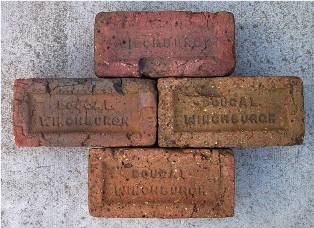
The Dougal family lived in Rockville, Linlithgow and owned the brickworks at
Winchburgh.
On 20th October 1921, Johnís wife, Lizzie, a music teacher, died at Craigforth.
A few months prior to the closure of the West Lothian Pottery in 1929, John moved to St. Margaretís (below), Royal Terrace, Linlithgow
to live with his daughter, Janet, and her family.
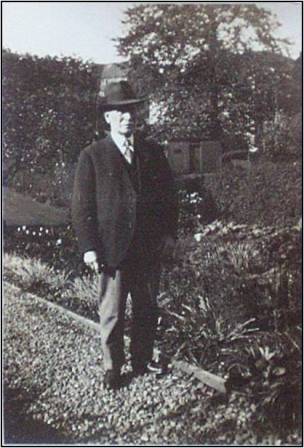
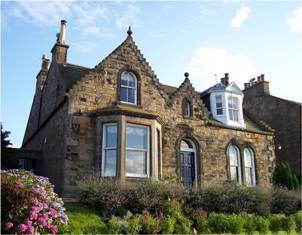
John died on 4th July 1939, as a result of myocarditis (inflammation of the heartís muscular tissue), at Falkirk Royal Infirmary.
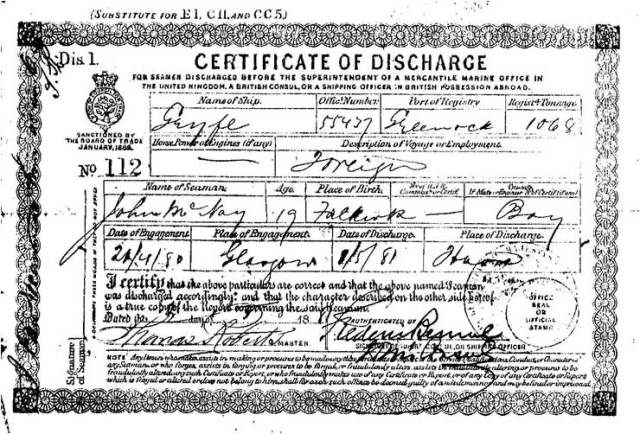
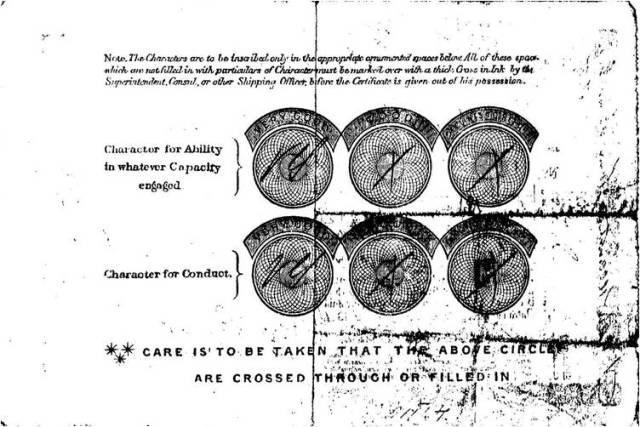
John's love for the sea saw him complete a "Foreign" voyage in 1881 (above) and a trip to Chittagong in 1883 (below)
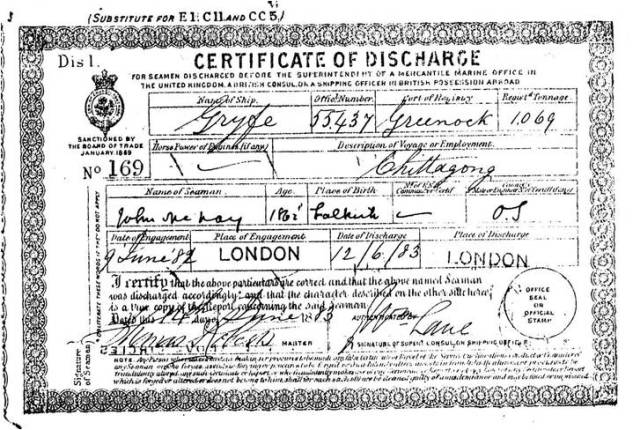
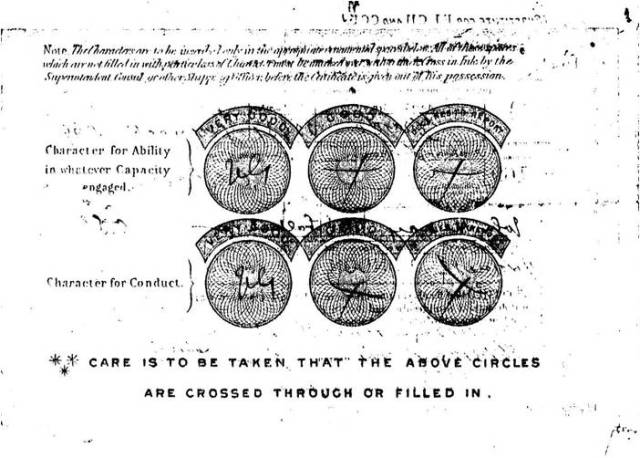
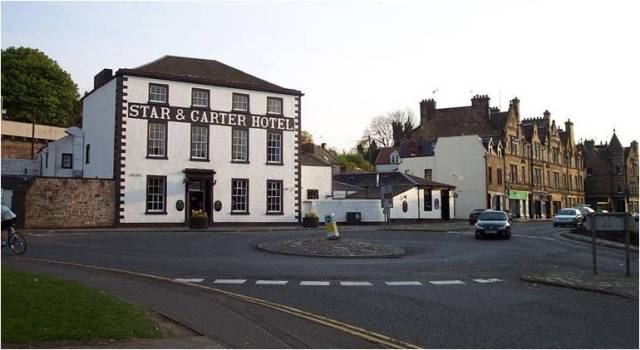
On 19th February 1923, following the annual general meeting, at a function in the Star and Garter Hotel, Linlithgow, John McNay was
presented with a diamond scarf-pin in recognition of his 25 years as manager. The diamond cluster was later made into a ring and, at
the time of this photo in 2005, was the property of his grand-daughter, Jenny Dougal.
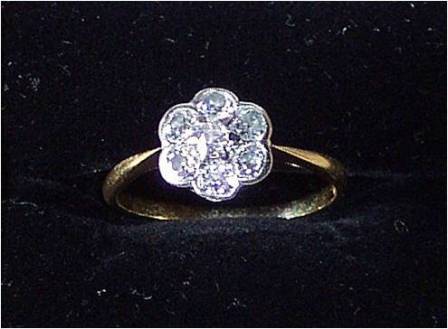
(John's daughter) Janet Ritchie
McNay's Christening Mug (right)
decorated at Bridgeness Pottery
in 1888.
The Christening Mugs for John's
three grand daughters were
decorated at West Lothian Pottery
and are shown below.
Larger photos showing the full
decorations can be seen HERE.
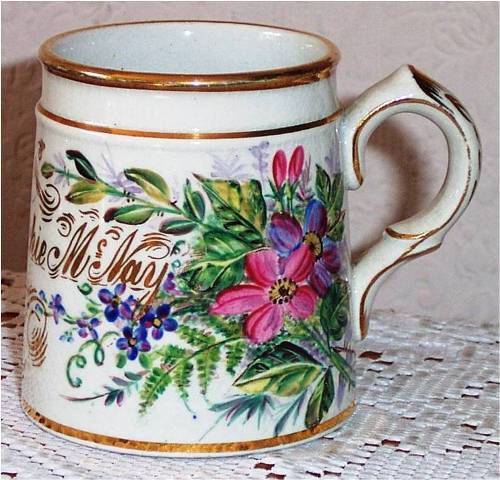
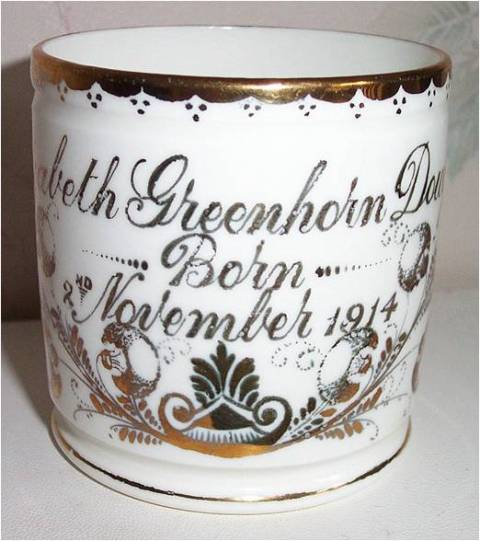
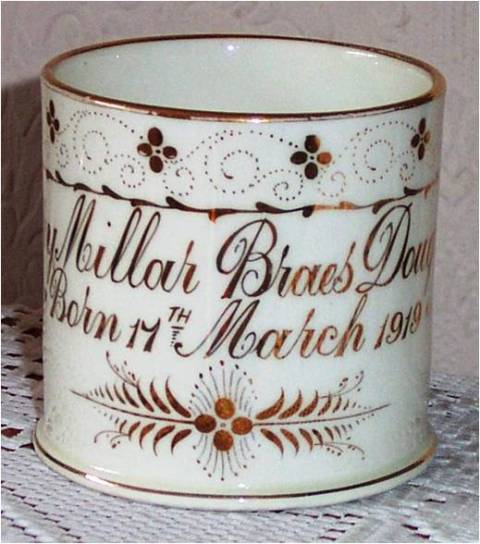
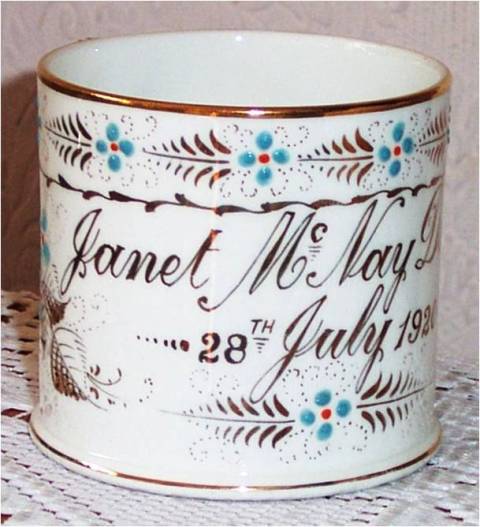
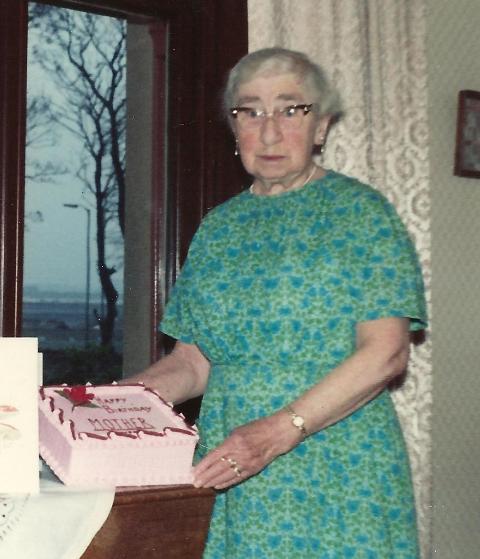
Janet Ritchie McNay in later years
Obituary from Boíness Journal, Friday July 7th, 1939
Boíness Pottery Expert Dies
THE LATE MR JOHN McNAY
Mr John McNay, who had long experience on the pottery trade in Boíness, died at Falkirk Infirmary on Tuesday at the age of 77. A
native of Falkirk, Mr McNay learned the rudiments of the trade in the original Boíness potteries owned by Messrs John Marshall & Co.,
under the supervision of Mr Charles McNay, his uncle. He passed through all the departments and ultimately became manager.
In 1890 the Scottish Co-operative movement built and opened a pottery at Grangepans, Boíness. This undertaking was financed by the
Federation of Co-operative Societies for the manufacture of jars and other wares for their stores throughout the country. The
experiment proved a financial failure, and the pottery was latterly acquired by the West Lothian Pottery Company Ltd. of which Mr
McNay was managing director until it closed down after the war.
Mr McNay during his period of over half a century in Boíness took an active part in public affairs, particularly in connection with the
administration of education. He was chairman of the School Board and later of the School Management Committee, and a member of
the Education Authority.
He took a keen interest in local yachting activities, and frequently acted as starter at the yacht club regattas.
Mr McNay who was predeceased by his wife some years ago, has latterly been living with his daughter, Mrs Dougal, at Linlithgow.
Obituary from Linlithgowshire Gazette, Friday July 7th, 1939
THE LATE MR JOHN McNAY
Death of Managing Director of West Lothian Pottery
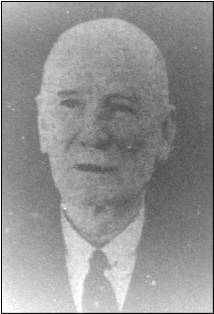
We regret to record the death of Mr John McNay which occurred at the Falkirk and District
Royal Infirmary on Tuesday morning.
From a major operation performed two years ago, Mr McNay made a good recovery. In the
spring of this year, however, he had a relapse, and passed away peacefully in the early hours
of Tuesday morning. He was in his 78th year.
A native of Falkirk, he spent the days of his youth at sea, but he was still a young man when
he went to Boíness and entered the service of John Marshall & Company, of the Boíness
Pottery, of which company his uncle, Mr Charles McNay, was then the sole surviving partner.
Mr McNay passed through all the departments and rose to the position of manager of the
concern.
The pottery turned out all kinds of brown ware, basins, crocks and water jugs, made from local
clay. Four hundred hands were employed. The pottery company had a considerable trade
with Germany, but when that country adopted Protection, Scottish goods were shut out from
the free port of Hamburg. With characteristic enterprise, the company found fresh outlets for
their ware in Ireland and in the Colonies.
Punch Bowls and other Ornaments
Popular lines in Mr McNayís managerial days were punch bowls, dinner sets of the willow
pattern, and fireside ornaments. The Marshall family had in their possession a priceless punch bowl made at the pottery in 1794, and it
formed an interesting exhibit at the International Exhibition in Glasgow.
These punch bowls were beautifully hand-painted and bore popular mottoes such as:-
Another couplet read:-
The dinner sets were of 60 pieces and sold wholesale at 14s. Mr McNay boasted that he booked one thousand dinner sets in one day
for delivery to a retailer in Glasgow. Equally popular were the hearth ornaments, lions, dogs, cats, parrots and cocks. No fireplace was
complete without a cat or dog standing guard over it, and no kitchen dresser was properly equipped without its richly painted punch
bowl. A long, broad mantelpiece was often packed with china ornaments in great variety.
Pottery Failures
Mr McNay was the main promoter of the West Lothian Pottery Company, Ltd., which took over the range of buildings in Grangepans,
built by the Federation of Co-operative Societies in 1890. That pottery was established for the manufacture of jars and other ware for
the Co-operative stores throughout the country. The experiment proved a failure, and, along with others, Boíness Co-operative Society
lost £1000 which they had invested, and paid up in instalments of £250 each, as from 10th January, 1890.
Mr McNay was often heard to deplore the decline in the pottery industry in Scotland. He saw no fewer than twelve potteries close down
from time to time on account of foreign competition and trade depression. The West Lothian Pottery Company was wound up some ten
years ago, leaving the Bridgeness works and the pottery at Pollokshaws the sole survivors of what was one of the most prosperous
industries in Scotland in pre-war years.
Public Work
During his long residence in Boíness, Mr McNay took a deep interest in public affairs. A personal friend of the late Mr James Kidd, the
Rev. Wm. Dundas, Mr W. S. Andrew and other prominent Carriden parishioners, Mr McNay was induced to enter the old Boíness and
Carriden School Board, and he was soon revelling in the thick of controversies which raged over schools and school buildings in the
combined parish. He generally ranged himself on the side of the representatives of the East, and was a strong supporter of their
centralisation policy, which resulted in the erection of Grange School. He was very proud of this building, and more than once officiated
at the annual distribution of medals and prizes.
After the closing down of the West Lothian Pottery, Mr McNay removed from Boíness to Linlithgow, taking up residence with his only
daughter, Mrs Alex. Dougal, St. Margaretís, Royal Terrace, Linlithgow. He spent two years of his retirement among his numerous
friends in Falkirk. Mr McNay was predeceased by his wife, a sister of the late Mr Wm. Campbell, grocer, Falkirk, eighteen years ago.
Cricket and tennis were his chief outdoor recreations. He was one of the promoters and original members of the tennis courts at Grange
Terrace, and played frequently in club matches.
Because of his seafaring leaning, he enjoyed the friendship of Firth of Forth pilots, and spent several weeks in the summer season at
the pilotsí station at Inchgarvie, where he found scope for his life-long interest in ships and boats and in sailing. He was a keen
yachtsman.
During his stay in Boíness, Mr McNay was a devoted member and office-bearer of Craigmailen U.F. Church, and a staunch supporter of
the minister, the Rev. D. G. Young.
What art can with the pottersí art compare?
For what we are ourselves of such we make our ware.
Will the love that you are rich in,
Make the fire thatís in the kitchen.
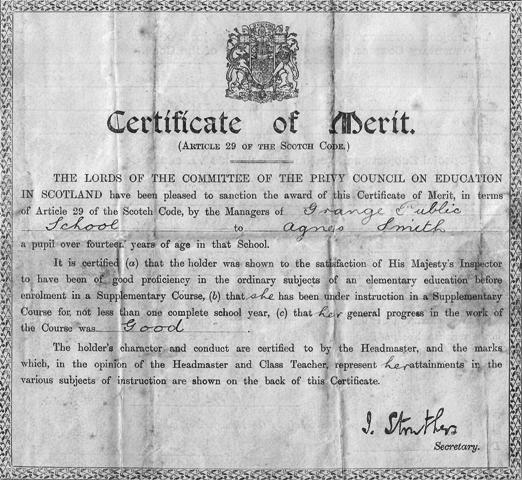
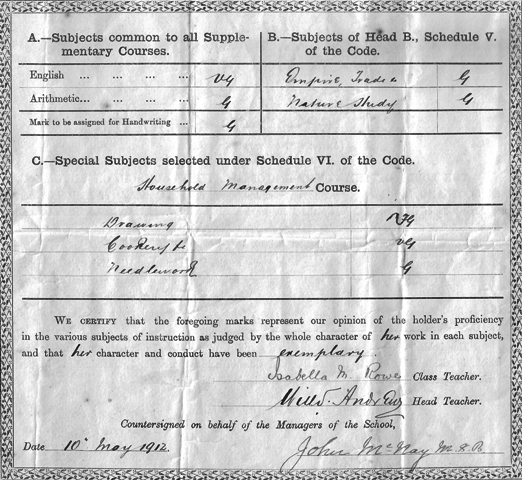
As mentioned above, John was instrumental in the erection of Grange School. Below is my granny's Certificate of Merit, issued by
Grange School and countersigned by John McNay in his role of Manager of the School Board.